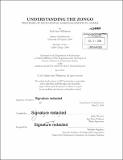Understanding the Zongo : processes of socio-spatial marginalization in Ghana
Author(s)
Williamson, Emily Anne
DownloadFull printable version (57.05Mb)
Alternative title
Processes of socio-spatial marginalization in Ghana
Other Contributors
Massachusetts Institute of Technology. Department of Architecture.
Advisor
James Wescoat.
Terms of use
Metadata
Show full item recordAbstract
The spatial processes of marginalization and ghettoization have been described, labeled, and theorized extensively in the United States and Europe, yet there has been little research dedicated to these processes in the literature concerning urban Africa. Rather than using prescribed Western concepts, this thesis interrogates the spatial processes of marginalization by beginning with the local and particular - in this case, the Zongo, a fascinating, and understudied historical phenomenon in Ghana. Zongo means "traveler's camp" or "stop-over in Hausa and was used by British Colonial Officers to define the areas in which Muslims lived. Traditionally, the inhabitants of these settlements were Muslims migrating south either for trading purposes or as hired fighters. Today, Zongos have become a vast network of settlements and there is at least one Zongo in every urban center in Ghana. Since these ethnic groups were not indigenous to the territory, it is not surprising that many were historically marginalized. This thesis, therefore, uses history as the primary mechanism by which to dismantle, complicate, re-construct, and understand the Zongo phenomenon - to demonstrate how it has evolved over time - with and against political, economic, and religious forces. Rather than a sweeping comparative approach between settlements, the strategy is to deeply investigate its most extreme case of marginalization - that of the Zongo located in the coastal city of Cape Coast. It seeks to answer what combination of historical and social factors have caused the Cape Coast Zongo to become so marginalized. The research identifies five periods, Imperialism, Segregation, Nationalism, Industrialization, and Globalization, that mark important ideological and political shifts in the history of marginalization in Cape Coast and then examines what themes emerge from this particular historical case that may be generalized for all Zongos. Furthermore, the thesis contributes to larger theoretical discussions explaining how, why, and when ghettoization appears and functions in West Africa.
Description
Thesis: S.M., Massachusetts Institute of Technology, Department of Architecture, 2014. Cataloged from PDF version of thesis. Includes bibliographical references (pages 210-215).
Date issued
2014Department
Massachusetts Institute of Technology. Department of ArchitecturePublisher
Massachusetts Institute of Technology
Keywords
Architecture.